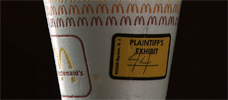Reviews
Marshall Curry and Sam Cullman
USA, 2011
Credits
Review by Katherine Follett
Posted on 18 May 2011
Source Digital Projection
Categories The 2011 Independent Film Festival Boston
If a Tree Falls gives us an unprecedented picture of the people behind the Earth Liberation Front, or ELF, a militant environmentalist group that uses vandalism and arson to attack corporations it believes endanger the Earth. The ELF has been nearly impossible for both the media and law enforcement to track because of their self-enforced anonymity and decentralization. Before the FBI cracked the case featured in this documentary, not a single face, name, place, or organization was definitively linked to ELF activity.
The face that finally emerged was the unlikely one of Daniel McGowan, the main subject of If a Tree Falls. Directors Marshall Curry and Sam Cullman spend most of their time with McGowan, who is under house arrest in the formal custody of his sister. He might be the most sympathetic person ever branded a terrorist.
McGowan tells the filmmakers the story of his normal New York upbringing and his sudden turn to activism after college when he first began to consider humanity’s impact on the environment. After moving to the Pacific Northwest and joining several demonstrations, including the notorious WTO protests in Seattle, he became further radicalized and joined with other activists who no longer felt that nonviolent action was enough. Along with a few dozen other “Elves,” McGowan burned a logging company headquarters while connected cells torched a ski resort in Vail, Colorado, a state ranger’s office in Oregon, a Michigan State University GMO lab, and a tree farm that was supposedly conducting genetic experiments. McGowan pulled away from the group when the collateral damages began to weigh on him: the Michigan State fire also burned a library; the tree farm’s current owners were no longer using genetic techniques. He returned to New York, where for years he continued his activism in constructive ways, with no evidence to link him to his past. When the FBI suddenly arrested him, years after the arson, he was working with one of the directors’ wives at a domestic violence organization.
McGowan comes across as educated, thoughtful, funny, humble, and optimistic. He expresses remorse about his destructive crimes, but stands by his environmentalist ideals. Even though he’s facing life in prison, he actually marries his long-term girlfriend. And he insists that he will accept that life sentence if the only other option is to rat out members of the ELF. Put simply, he’s just an admirable guy. Other evidence included in the documentary ends up weighing in McGowan’s favor as well. There’s nearly unwatchable footage of law enforcement shooting pepper spray point-blank directly into the eyes handcuffed, immobile environmental protesters. There’s footage of clear-cut northwestern hillsides and trains full of stacked lumber bearing the name of the company McGowan torched. Though they were destructive and lamentably ignorant about their targets, all ELF cells took great pains to ensure that no living things were harmed during their vandalism, which is reenacted in a slightly cheesy, but evocative blacked-over video effect.
The documentary in no way feels like a Michael-Moore style polemic, though. The filmmakers went to great pains to be even-handed. The lumberyard owner, the victim of McGowan’s crime, comes across as bewildered that anyone could hate him so much that they’d torch his business. Law enforcement officers bring an almost gleeful whodunit enthusiasm as they slowly and doggedly break a nearly unbreakable case. Even one ELF member - who began as the most militant, only to turn informant and bring the entire organization down - is portrayed as more pitiful than evil, a heroin addict whose paranoia made him an easy target during interrogation. The conclusion the documentary leads us to - that McGowan made a mistake, but is being punished far out of proportion - feels entirely fair. This is a careful film, a work of long study and great empathy, deeply informative in a patient, PBS kind of way. And even if the conclusions it draws seem clear, it gives this confusing, controversial, and complicated issue the attention it deserves.
More The 2011 Independent Film Festival Boston
-

13 Assassins
2010 -

Ivan & Ivana
2011 -

Being Elmo: A Puppeteer’s Journey
2011 -

Bellflower
2011 -

Convento
2011 -

Cure for Pain: The Mark Sandman Story
2011 -

The Trip
2010 -

El Bulli
2010 -

Submarine
2010 -

Stake Land
2010 -

Another Earth
2010 -

If a Tree Falls
2011 -

Terri
2011 -

The City Dark
2011 -

Littlerock
2010 -

Superheroes
2011 -

Hot Coffee
2011 -

Conan O’Brien Can’t Stop
2011
We don’t do comments anymore, but you may contact us here or find us on Twitter or Facebook.



